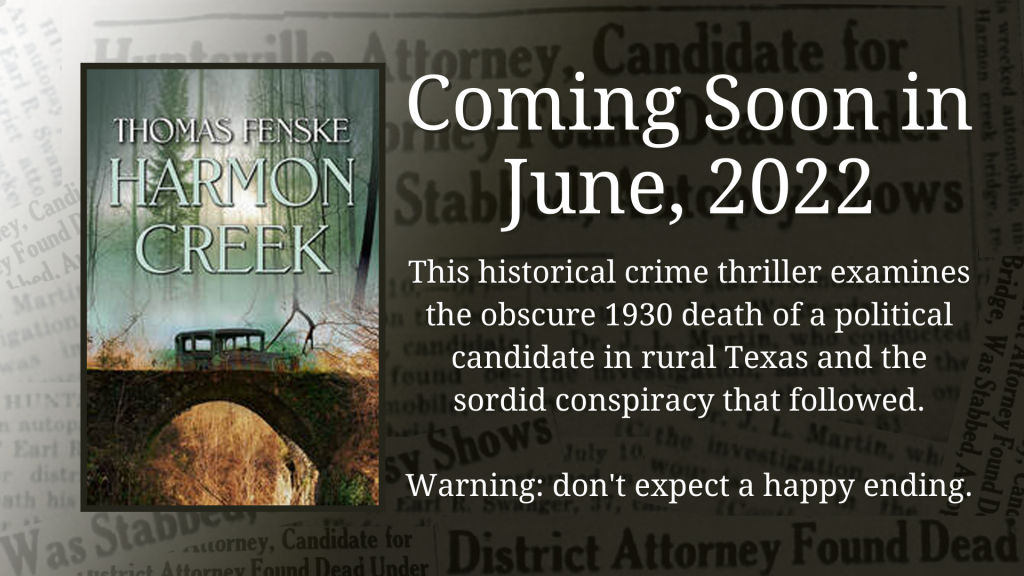Harmon Creek opens with a man sitting uncomfortably in court. We find out his name is Claude, and Earl Swanger is his attorney. Claude is a black man at odds with the world he lives in. He was arrested for petty bootlegging during prohibition and the sitting District Attorney is prosecuting him like a hardened criminal. Why? Because Claude is represented by his opponent in an upcoming election.
Claude is not part of the real story, at least as far as I know, but he’s based on a real person. My wife knew the real Claude much later when she’d visit the house of Earl’s widow, Lily May. He was a common presence in the house and on the property. The two had an interesting relationship. Well, relationship is probably the wrong word because there was nothing romantic here. He was a neighbor who had an uncommon devotion to “Miss Lily May” … he was more friend than a handyman and he certainly did a lot of work for her, but for the mid-Twentieth Century in a racially divided America it was certainly a kind of Driving Miss Daisy sort of friendship. Knowing this man was one of my wife’s fondest memories of her visits.
I have always been intrigued by this notion, so I endeavored to add Claude to the equation to perhaps inject some sense to it, at least in my mind. Also, the character Claude adds a great deal of depth to the story and creates a side-story that interweaves with the rest of the novel to make it more compelling, or at least I hope so. In most ways, it is as much Claude’s story as it is Earl’s.
Although the family thought Earl’s death was outright murder, after digesting as many facts as I could, I didn’t think so. I’ve studied murders and although some are cut and dried, most revolve around something quite different, more likely a misunderstanding that got out of hand.
Some of the later witness statements devolved into insinuations by the mysterious woman that Earl had perhaps been drunk or possibly had been behaving inappropriately with her. She apparently changed her story several times, with each iteration becoming more prone to the latter notion.
Please understand, I’ve read family letters both from him and about him, and this man was a nice guy, not prone to cheat on his wife, certainly not a drunk, and anyway, to do so in the middle of a campaign would be political suicide. I also didn’t think an incumbent would be so stupid as to assassinate an opponent. It’s too obvious.
Cheating? I mean, this was a small town, and Miss Lily May was out campaigning for Earl in another section of the district. It was getting into the final stretch. No, this was out of character for this guy.
Ah, but a setup…that would work. Even a somewhat dirty DA wouldn’t be above hiring someone to lure his opponent into the appearances of impropriety. Once I created this premise, the rest of it pretty much wrote itself. I had a backdrop of truth to paint my story against and the increasingly sordid tale meandered across several of the complications that naturally follow these types of crimes.
It’s an old motif. Witnesses who can’t keep quiet, or who you can’t trust completely, must be kept quiet by whatever means. And if the DA is dirty, he’s probably in cahoots with organized crime, which wasn’t just active in Chicago and New York; Huntsville TX sits within the range of a major organization operating out of Galveston at the time. Similar operations existed in Dallas and New Orleans. It makes sense that if there is unwanted attention in even a backwoods part of the operation, it is in these organization’s best interest to help smooth the waters and, if necessary, help each other in the process.
I don’t want to spoil the fun … you’ll just have to read it!
==========================
Thomas Fenske is a novelist living in North Carolina.
Look for HARMON CREEK in June 2022 on Amazon or ask your favorite bookstore to order it.

